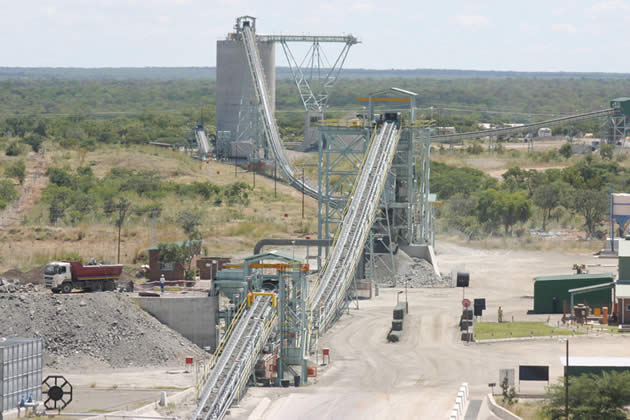
The Sunday Mail

FOR a country that is scrounging for resources to sustain basic Government functions, not least to fund civil servants’ salaries, it is very disturbing that it can open its purse to pay US$102 million to a single mining company – Zimplats – as a refund for overpaid royalties that have accrued in the past 10 years.
The payment was processed in the fourth quarter of 2015.
It is important to note that the royalty refund was prompted by a High Court ruling by Jusitice Lavender Makoni in January 2015, which effectively guaranteed the sanctity of a mining agreement signed between Government and Zimplats in 1994.
The fatal undertaking Government made in the 1994 agreement was to peg Zimplats’ royalties at 2,5 percent of fair market values.
In essence, it made royalty reviews made after 1994 non-binding, hence the platinum producer’s claim that it overpaid royalties between January 1, 2004 and September 30, 2010 by paying as much as 3,5 percent.
Also, further royalties accrued in the four-year period to 2014 when platinum royalties were twice reviewed upwards, reaching 10 percent on January 1, 2012.
It is not so much the US$102 million payment made to Zimplats that is shocking and disturbing – as the company is entitled to its dues – but it is the nature of the mining agreements generally signed by Government and mining companies that is cause for concern.
The situtation is not peculiar to Zimbabwe and it is something prevalent in countries whose mineral endowments are described in superlatives.
It must not be forgotten that Zimbabwe holds the world’s second-largest platinum reserves after South Africa.
Suspiciously, not much is disclosed about the nuts and bolts of these agreements; they remain murky at best and skewed at worst.
Economists have for years been trying to reconcile why resource-rich countries grapple with poverty. But with such prejudicial agreements deals, it not hard to see why.
It seems mineral-rich countries continue to be outwitted, outflanked and, most importantly, out-negotiated by mining companies when these mining agreements are forged.
The Sierra Leone rip-off
In 2010, a cost-benefit analysis commissioned by the Network Movement for Justice and Development, an NGO established in Sierra Leone in 1988, fell short of calling a mining agreement between London Mining and that country’s ministry of mines and mineral resources in December 2009 a huge fraud.
In fact, London Mining, a UK-based miner focused on developing mines for the steel industry, was accused of holding the economy hostage.
Sierra Leone’s Tonkolili region hosts the biggest iron ore deposit in Africa and the third-largest in the world.
Critically, the NMJD report indicated that while the industry trend was to negotiate for royalty rates based on the FE (iron) content of iron ore, which on average ranged between three and six percent in different countries, the agreement with London Mining pegged the rate at three percent regardless of the actual iron content in the ore.
Royalties were to be paid after deducting sales tax, value added tax, goods and services tax, export duty and excise tax, which effectively meant that the government would not receive any royalties during times when the companies were reporting “losses”.
It gets worse.
It was agreed that London Mining would pay royalties based on gross sales ‘free on board’ the vessel at the Sierra Leone off shore loading facility, whose prices are significantly lower than market prices.
Estimates suggested that the government of Sierra Leone stood to lose as much as US$241 million in revenue over the first decade of the agreement.
Furthermore, London Mining and Africa Minerals, another London-heardquartered mining company, “were exempt from paying any minimum taxation which is contrary to the Income Tax Act which states that the holder of a mining license shall pay a minimum Income Tax of 3,5 percent of turnover where chargeable income is below seven percent of turnover”.
Mrs Aminata Kelly Lamin – the programme director of mining and extractives at NMJD – gave a notable verdict.
She said: “Our minerals cannot be replaced if we are to give our natural wealth away to these companies, the fiscal incentives should make it a win-win situation; according to these agreements, however it’s not worth it.”
The DRC dilemma
Closer to home, the DRC – estimated to have minerals worth US$24 trillion, equivalent to the combined GDP of Europe and the United States – has been struggling to get the maximum possible benefit from its resources.
Faced with piece-meal contributions of mining royalties to the fiscus, the DRC government sought to renegotiate mining agreements between 2007 and 2010.
It mainly targeted 63 mining contracts on suspicion of illegal mining exploration. Its efforts have been frustrated.
Last Wednesday, the DRC mines minister told delegates at the annual mining indaba in Cape Town, South Africa that the government had suspended plans to revise the country’s mining code.
The DRC initiated the review of the country’s 2002 mining code in 2012.
London-based Global Witness criticised the move by claiming that “Congo’s government appears to have caved in to industry pressure to maintain the cosy fiscal terms and lax regulations governing Congo’s mining sector”.
Indigenisation is key
The bargaining power of mining companies, some of which have been operating for over a century in one form or another in various jurisdictions and hence have the experience to “handle” host governments, has to be fully appreciated.
Zimbabwe has nasty historical experiences from the Rudd Concession, which was signed on October 30, 1888 between Charles Rudd, Rochfort Maguire and Francis Thompson – the three agents of Cecil John Rhodes – and King Lobengula, which ceded exlusive mining rights to the fortune seekers.
Over the years, mining companies have been able to perfect the art of negotiating such lop-sided mining deals, knowing fully well that it will be difficult for the host governments to renogotiate them once signed.
The Zimplats negotiators of the 1994 agreement must have got a pat of on the back from investors.
And the Zimplats managers who either armtwisted or smooth-talked Government to release an eye-watering US$102 million royalty refund will most definitely get a huge pat in the back from the investors.
But it is Zimbabwe that is left all the poorer.
Given, it will take superhuman effort to renegotiate some of the flawed mining agreements that have already been signed.
However, Government’s indigenisation drive, which mainly zeros in on the extractive sector where resources are non-renewable, provides a handy tool to address such anomalies.
Within such a framework, Government has a case and basis to negotiate from a position of strength.
Going forward, Government must learn from the Zimplats saga to negotiate favourable deals for the country.
It is also high time that mining contracts be made public so that they can be critiqued.
Clearly, keeping such key agreements under lock and key can only work in the favour of corrupt bureacrats and greedy mining companies.
Feedback: [email protected]
A reader’s take on the saga
What we learn from this that we need to teach our experts and those involved in any negotiation of any kind the art of negotiation. I think that payment of royalties to Zimplats by GoZ (Government of Zimbabwe) is only fair because it is what GoZ agreed to.
Once an agreement is in place we should not be seen to vacillate for we undermine trust and reliability.
We should take our time to negotiate deals and ensure that we have highly skilled negotiators with whom we have clauses in agreements that should we find they undermined the negotiation process we deal with them rather than the investor.
No investor comes and negotiates with us “takasungwa mbira dzaKondo”.
No.
It is our negotiators who don’t understand the long-term implications of what they negotiate.
At the end of the day we don’t get what we deserve.
We get what we negotiate. This is not a negative but rather a positive as it goes a long way to show we have rule of law and by upholding this and paying we have send clear message that we are serious about what we say.
Action creates miracles.
Wilson Magaya



